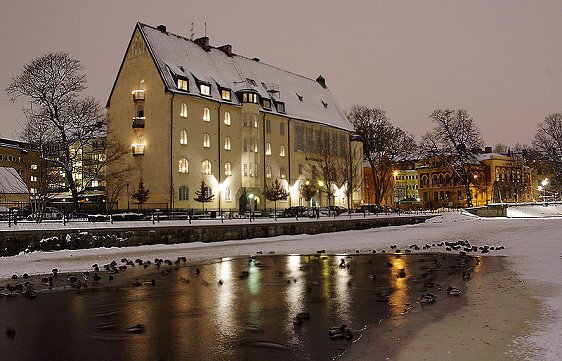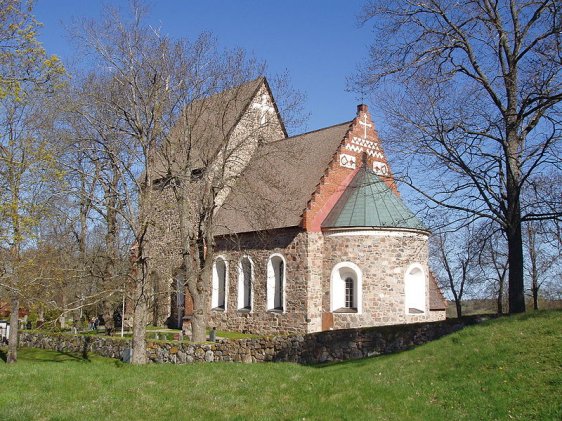 Alfvénsalen, Uppsala, Sweden
Alfvénsalen, Uppsala, SwedenSource: https://commons.wikimedia.org/wiki/File:Januari2006057.jpg
Author: Mattias Wennström

Uppsala is today the fourth largest city in Sweden. A renowned university town, it is the capital of Uppsala County and places the important role as the seat of the Archbishop of the Church of Sweden since 1164. The Uppsala University, founded in 1477, is also the oldest institution of higher learning in Scandinavia.
Sights & Attractions in Uppsala
- Botaniska Trädgården
Famous botanical garden with some 130,000 plants. Famous botanist Carl von Linné was in charged of it in 1741, and he turned it into one of the leading gardens of its time. - Carolina Rediviva
The university library of Uppsala, home to some 5 million printed books and 4 kilometers of shelf space. - Domkyrkan
The Uppsala Cathedral is the biggest church building in Sweden. - Gammla Uppsala
The old town quarters is a place that preserves the medieval as well as pagan sites of the town, such as the center for worshipping the Norse gods Odin, Thor and Frey. - Gustavianum
Named after King Gustav II Adolf, This is the oldest university building in Sweden, dating back to 1620. - Linné's Hammarby
Rural retreat for Carl von Linné, today maintained by the Uppsala University as a showcase of Linné's work. - Universitetshuset
The main building of Uppsala University built in the Neo-Renaissance style in 1887. - Uppsala Slott
The Uppsala Castle that commands a dominating presence over the city from its location on a glacier ridge.
Uppsala lies on the idyllic Fyrisån River, which cuts it into two halves. The city is surrounded by fertile mud flats some 70 km (43 mi) to the north of Sweden. The area may have been inhabited for two thousand years, but modern Uppsala got its start in the 12th century, just when Sweden was turning away from its pagan gods. The city quickly became the center for Christianity, and it received an archbishop in 1164.
 Gamla Uppsala kyrka, the old church of Uppsala
Gamla Uppsala kyrka, the old church of UppsalaSource: https://commons.wikimedia.org/wiki/File:Gamla_Uppsala_-_church.jpg
Author: Lestat

The city of Uppsala today beautifully preserves its many medieval buildings which includes its university, cathedral, castle, botanical gardens and old town. The city experiences a humid continental climate approaching the subarctic climate. The warmest month here is July, when the average high temperature rises to 21°C (70°F). February is the coldest month in Uppsala, when the average low temperature drops to -8°C (18°F). July is the wettest month with 72 mm (2.83 in) of precipitation.
 Uppsala Cathedral
Uppsala CathedralSource: https://commons.wikimedia.org/wiki/File:Uppsala_Cathedral_two_towers.jpg
Author: Oden

Visiting Uppsala
You can easily get to Uppsala by taking a train from Stockholm. Train services are also available from Västerås and Sundsvall. There are also buses from Stockholm, Gothenburg, Malmö and other major cities. Uppsala does not have an airport, so the nearest major airport is that of Stockholm. Latest updates on Penang Travel Tips
Latest updates on Penang Travel Tips
About this website

Thanks for reading this page. My name is Timothy Tye. My hobby is to research information about places, and share the information with people on this website. I started this website on 5 January 2003, and since then, have written about over 20,000 places, mostly in Malaysia and Singapore.
Please use the information on this page as guidance only. While I try my best to provide you information that is as accurate as I can get it to be, I do apologize for any errors. Also, as I might not be able to update some information on time, some of these pages may contain outdated information.
Copyright © 2003-2024 Timothy Tye. All Rights Reserved.


 Go Back
Go Back